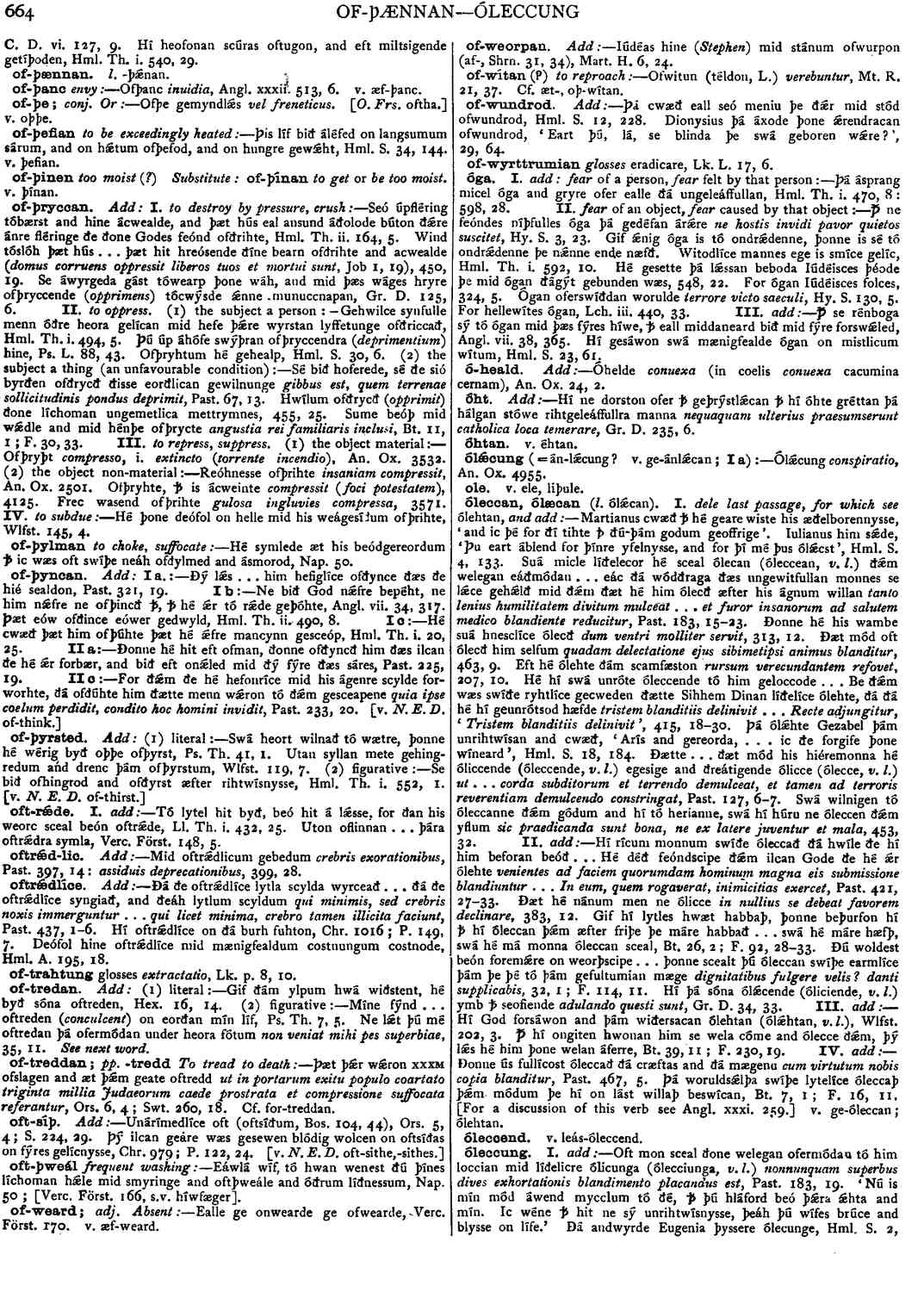óleccan
-
Martianus cwæð ꝥ hé geare wiste his æðelborennysse, 'and ic þé for ðí tihte ꝥ ðú-þám godum geoffrige'. Iulianus him sǽde, 'Þu eart áblend for þínre yfelnysse, and for þí mé þus ólǽcst',
- Hml. S. 4, 133.
-
Suá micle líðelecor hé sceal ólecan (óleccean, v. l.) ðǽm welegan eáðmódan . . . eác ðá wódðraga ðæs ungewitfullan monnes se lǽce gehǽlð mid ðǽm ðæt hé him ólecð æfter his ágnum willan
tanto lenius humilitatem divitum mulceat. . . et furor insanorum ad salutem medico blandiente reducitur,
- Past. 183, 15-33.
-
Ðonne hé his wambe suá hnesclíce ólecð
dum ventri molliter servit,
- 313, 12.
-
Ðæt mód oft ólecð him selfum
guadam delectatione ejus sibimetipsi animus blanditur,
- 463, 9.
-
Eft hé ólehte ðám scamfæston
rursum verecundantem refovet,
- 207, 10.
-
Hé hí swá unróte óleccende tó him geloccode . . . Be ðǽm wæs swíðe ryhtlíce gecweden ðætte Sihhem Dinan líðelíce ólehte, ðá ðá hé hí geunrótsod hæfde
tristem blanditiis delinivit . . . Recte adjungitur, 'Tristem blanditiis delinivit',
- 415, 18-30.
-
Þá ólǽhte Gezabel þám unrihtwísan and cwæð, 'Arís and gereorda, . . . ic ðe forgife þone wíneard',
- Hml. S. 18, 184.
-
Ðætte . . . ðæt mód his hiéremonna hé óliccende (óleccende,
v. l.) egesige and ðreátigende ólicce (ólecce, v. l.) ut. . . corda subditorum et terrendo demulceat, et tamen ad terroris reverentiam demulcendo constringat,
- Past. 127, 6-7.
-
Swá wilnigen tó óleccanne ðǽm gódum and hí tó herianne, swá hí húru ne óleccen ðǽm yflum
sic praedicanda sunt bona, ne ex latere juventur et mala,
- 453, 32.
-
Hí rícum monnum swíðe óleccað ðá hwíle ðe hí him beforan beóð . . . Hé déð feóndscipe ðǽm ilcan Gode ðe hé ǽr ólehte
venientes ad faciem quorumdam hominum magna eis submissione blandiuntur . . . In eum, quem rogaverat, inimicitias exercet,
- Past. 421, 27-33.
-
Ðæt hé nánum men ne ólicce
in nullius se debeat favorem declinare,
- 383, 12.
-
Gif hí lytles hwæt habbaþ, þonne beþurfon hí ꝥ hí óleccan þǽm æfter friþe þe máre habbað . . . swá hé máre hæfþ, swá hé má monna óleccan sceal,
- Bt. 26, 2; F. 92, 28-33.
-
Ðú woldest beón foremǽre on weorþscipe . . . þonne scealt þú óleccan swíþe earmlíce þám þe þé tó þám gefultumian mæge
dignitatibus fulgere velis ? danti supplicabis,
- 32, 1; F. 114, 11.
-
Hí þá sóna ólǽcende (óliciende, v. l.) ymb ꝥ seofiende
adulando questi sunt,
- Gr. D. 34, 33.
-
Hí God forsáwon and þám wiðersacan ólehtan (ólǽhtan,
v. l.),
- Wlfst. 202, 3.
-
Ꝥ hí ongiten hwonan him se wela cóme and ólecce ðǽm, þý lǽs hé him þone welan áferre,
- Bt. 39, 11; F. 230, 19.
-
Ðonne ús fullícost óleccað ðá cræftas and ðá mægenu
cum virtutum nobis copia blanditur,
- Past. 467, 5.
-
Þá woruldsǽlþa swíþe lytelíce óleccaþ þǽm módum þe hí on lást willaþ beswícan,
- Bt. 7, 1 ; F. 16, 11.
Bosworth, Joseph. “óleccan.” In An Anglo-Saxon Dictionary Online, edited by Thomas Northcote Toller, Christ Sean, and Ondřej Tichy. Prague: Faculty of Arts, Charles University, 2014. https://bosworthtoller.com/56413.
Checked: 0